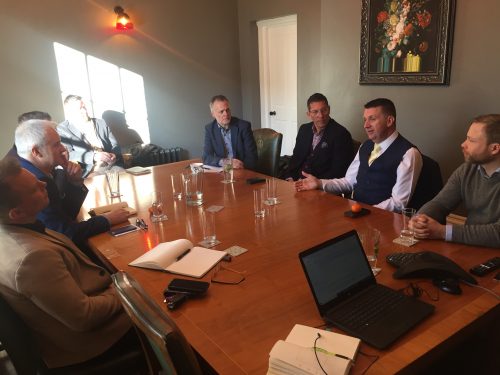Round table: Planning for the future from a position of strength

Planning for the future is an essential part of running a successful business, but there’s more to it than just that, as our latest round table panel discussed. With thanks to sponsors Ryley Wealth Management.
What is the first thing an entrepreneur should do when embarking on personal financial planning?

Mark Platt: I don’t have pension; should someone at my age and with my ambition take that advice?
Ryley: You’d have to fund the pension really heavily. It doesn’t have to to be a pension, of course – it can be another investment vehicle.
Graeme Gladstone: You have to a holistic approach – there are tax and legal implications and it can seem expensive – but look at the long-term value.
Harry Walker: The earlier you think about these issues, the better.
John McCay: You are where you are. The priority is to not stop being innovative; you can’t do anything unless you create wealth.
Ryley: It’s worth remembering that if your business is successful and starts throwing off cash, you can start getting sizeable corporation tax bill. Pensions can reduce these.
Gladstone: It’s increasingly common that entrepreneurs have all their wealth tied up in their business. They tend to be cautious when it comes to investing their cash and stall a little bit.
What are the most common mistakes entrepreneurs make when starting this process?
Ryley: For serial entrepreneurs, it’s common to think that success in one business means they’ll be successful in another. It’s common for them to become slightly ego-driven.
Andrew Springhall: I’ve had 14 business, they’ve not all been successful and I’ve lost money on some of then. It’s very easy to slip into the idea that when you’ve sold a successful business – as I did – then you think you can transfer those skills and experiences into a new business. When sold business and been successful think you can transfer.
Platt: There are nuances in all businesses and an owner has to be mindful when it’s not working.
Springhall: Many people, when they sell a business, want to do it all over again. I’ve always put great store in working with a great team of people. I believe that if you have the right people in place, then it doesn’t necessarily matter as much about the sector you’re in.
Ryley: That’s true. At the same time I think that if a person is in a role, and isn’t right for the role, then not changing their role or trying someone else in that job could lead to huge costs for the business.
Platt: I agree – If they’re not on the right bus, get them off.
McCay: Absolutely – it’s all about being decisive.
What challenges present themselves for those working in family businesses?
Will Diggins: It can make things difficult when it comes to planning for the future. Some family businesses don’t have processes, policies or succession plans written down and feuds between family members can kill a business. Others haven’t planned for worse case scenarios such as ill health or the death of a family member. Sometimes it’s better when a business is just a business and there is as little emotional involvement as possible.
Gladstone: It can be worse when you go down the generations to, say, the third generation where there can be a situation where control of the business is difficult. At that point, it almost becomes a case of mediation between the different parties involved.
McCay: You only know what you know and a lot of the time you’re going blindly forward. I’m very glad we have plans in place for succession.
Gladstone: The key is to do it while you’re still in a position of strength and in control. Do it all before you have an issue if at all possible.
Walker: Businesses are just collection of people will a title over the top. This is an area where outside investors can come in and give a dispassionate view on the business.
Would you say your personal finances are in order?
Springhall: If I die tomorrow – yes. If I live until I’m 90 I don’t know!
McCay: Yes, I’ve generally got things in place.
Platt: I’m only three years in, so I’m still finding feet. I don’t have my financial future sorted out – I realise I’ve been immature in the way I’ve approached it; I’ve done everything upside down and back to front. I’ve got some catching up to do.
Panel:
Mark Platt, Incite Consulting
Andrew Springhall, Breedon Electrical Services
Harry Walker, FRP Advisory
John McCay, Rizk McCay
Graeme Gladstone, BDO
David Ryley, Ryley Wealth Management
Will Diggins, Ryley Wealth Management
Sam Metcalf, TheBusinessDesk.com









